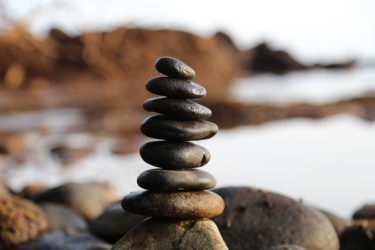When it comes to your health, it is critical to maintain balance. Many imbalances are the result of Doshas being out of balance. This article will cover Ayurveda’s 3 stages of life and how to keep them in balance.
In Ayurveda the Doshas are formed by the following five elements working together: Ether (space), air, fire, water, and Earth.

The five elements are associated with three phases of life in Ayurveda: Vata, Pitta, and Kapha. The five elements move through time and space and become Ayurvedic biological medial terms such as Vata, which is formed of ether/space components; Pitta, which incorporates fire and water; and Kapha, which includes water and Earth. The qualities, tendencies, characteristics, and attributes of the three “Doshas” are associated with each stage we all go through. If you want to discover your Dosha type click here.
Ayurveda’s 3 Stages Of Life
Kapha
The first stage begins with the “Spring Type,” Kapha. We all begin in the womb, a womb-like environment that is extremely wet. Immunity is established as the solidity of the Earth. This occurs throughout pregnancy and until puberty — usually beginning at birth and continuing through age 15. The term “Kapha” implies developing and shaping things. It’s anabolic in nature (nurtures the body and mind). Kapha regulates immunity.
Pitta
The next stage is Pitta, the “Summer Type.” Puberty begins with testosterone and estrogen transforming the body and mind. “That which transforms and digests” is a term meaning “pitta.” Previously, the average age was 15, but it has recently dropped to a lot earlier and lasts until about 45 or 50 years old.
Appetites and metabolism rise as testosterone is abundant in men and estrogen is potent in women, and eating habits and metabolism improve. Pitta controls the endocrine system and digestive systems. Sex drive increases. The goal of pitta is to establish oneself in the world through one’s self-identity, similar to how the sun wants to be seen more.
Vata
Vata is the final stage known as the “Fall Type.” When the processes of andropause and menopause are triggered, Vata begins. Andropause is a testosterone deficit in males caused by an increased estrogen, whereas menopause is a testosterone surplus in females that causes estrogen depletion. The poles have reversed here.
The sex urge fades. Hunger fades. The nervous system is controlled by Vata, which means sleep quantity and quality may change. This is a more sensitive and delicate phase. When the final breath is taken, this phase comes to an end.
Tips To Keeping the 3 Doshas in Balance
Kapha
Kapha benefits from having a warm and dry environment. Physical exercise, as well as a mental activity such as reading and games, can help to balance Kapha imbalances naturally. Treat yourself to massages using hot oils. Enclose yourself in a space that is warm and bright.
Your diet has a significant role in establishing and then resolving imbalances. Balances may be restored by eating pungent, bitter, and astringent foods. Bitter melon, gourd, turmeric, fenugreek, apples, pomegranate, quinoa, tofu beans, lentils are some examples of balanced meals.
Fixing imbalances might be aided by drinking ginger tea and ensuring that your body is getting enough healthy fats and oils through the consumption of food warm. Avoid cold items like asparagus soup or carpaccio with sour cream on it! Almost any bean is acceptable for Kapha-based diets.
Pita
Pay careful attention to what you eat. Food and digestion cause pitta imbalances, which must be treated. You still want to consume warm, cooked meals, but add cooling foods and herbs (ghee, coconut water, coconut oil, lime, cucumber) to your diet.
Avoid spicy, sour, salty, pungent, or fermented foods. Nightshades (tomatoes, white potatoes, peppers, eggplant) should be avoided. Sweetness and astringency go hand in hand to restore balance. Drinking CCF tea (cumin, coriander, fennel) and ensuring your body receives the correct quantity of healthy fats and oils can assist with correcting imbalances.
Meditation relaxes the mind and reduces stress while fostering a connection with your inner self. Therefore, meditation, eating correctly, and remaining cool and comfortable are crucial for Pita problem therapy.
Another method to assist your Pita is to engage in mild exercise that fosters balance and flexibility. Yoga, self-massage, walks, short hikes, reducing duties, and avoiding conflict are just a few of the activities that can help you achieve a balanced Pita.
Vata
Keeping your body warm and comfy will help to cure Vata imbalances. Treat yourself to massages with warmed oils and stones, or surround yourself with soothing music and fragrant odors.
Pay close attention to what you eat since food is needed in the production of Vata imbalances and their correction. Sweet, sour, or salty tastes are beneficial in restoring balance. Making ginger tea and ensuring your body gets enough healthy fats and oils can assist with balancing problems, as can eating food warm. Frozen meals, cold meals, and dried foods should all be avoided. Likewise, bitter or pungent tastes should be avoided at all costs.
Final Thoughts
The ideal standard of health, according to Ayurvedic wisdom, is to have a balance and harmony between the Doshas in the body. Excess of one Dosha and scarcity of another Dosha in various tissues or organs or systems of the body will cause illness and disease in that tissue or body system.
It follows that it is critical to stimulate sluggish Doshas or to appease hyperactive ones and synchronize their behaviors across settings to promote general health and well-being.




